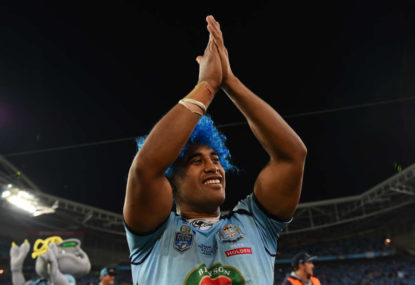Tackle it head on: Finucane and Lewis can teach the NRL why concussion rules have to change immediately
Dale Finucane will go down as one of the most honest, hard-working and inspirational players of his time. He’s what we want out of…

After Michael Jennings was arrested over the weekend, the usual headlines appeared, announcing another NRL player behaving badly.
It got me thinking about how current NRL players compare to those from previous eras, in terms of player behaviour.
Perception vs reality
Players are under greater scrutiny today than at any time in the past.
In an era of 24/7 news coverage and social media, where one’s misdemeanour is immediately splashed all over the internet for all to see, any poor behaviour is inevitably brought under the scrutiny of The Court of Public Opinion, quickly followed by the NRL Integrity Unit (launched in 2013).
Here, questions are raised as to whether there was a breach of the NRL Players Code of Conduct and whether the player has ‘brought the game into disrepute’.
I wonder how players from previous eras would cope under the same conditions.
Old timers tell me that back in the day (say from the 1950s to the late ’90s), players (including high profile ones) would regularly misbehave, but most of the time this went entirely unreported.
Many of the anecdotes from Kangaroo tours in the ’80s (some true, some embellished and some completely made up) are legendary, yet most of these tales highlight the maxim, ‘what goes on tour, stays on tour’.
Those acts were unreported because even when journalists knew about them, there was an unwritten rule not to sully their newspapers with that sort of thing.
On the odd occasion when misbehaviour was reported, the reaction generally was different to today.
Perhaps the most famous example was the ‘man with the bowler hat’ affair, in which a Test player on the 1967-69 tour of Great Britain and France paraded through the streets wearing nothing but a tie and a bowler hat on an evening that reportedly also saw a hotel left in a state of disrepair (the Fleet Street press said the Aussies left a “trail of damage”).
Part of the intrigue of this story was the fact no-one knew for sure who the man in the bowler hat was – for decades it was thought that the immortal Johnny Raper was the man in question, however Raper revealed years later that it was in fact second-rower Dennis Manteit.
One wonders how the media and public would react today if an NRL player adopted the same attire as Manteit. There’s no doubt the player’s identity would not be secret, given that every mobile phone doubles as a camera, but there’s also no doubt that the player would be suspended and fined for bringing the game into disrepute.
Now, I’m not suggesting that players should be able to get away with walking down George Street presenting the family jewels to the world, but rather that players in the past got away with a lot more than those today.
Responsibility
One common refrain is that as these blokes are on good coin, so they should be more responsible and not act like flaming idiots.
I couldn’t agree more. Given the stratospheric contracts that some of these guys are on, it’s inconceivable that they would be so moronic to risk losing it all for a night of tomfoolery.
The thing is, I reckon most NRL players would agree. While we do get the odd story of drunken behaviour and public urination, the reality is that as professional athletes, the average NRL player drinks less alcohol than those in the past – they are also fitter, have more strenuous training regime, have formulated diets, and some even partake in the odd kale sandwich and coconut water smoothie.
Put simply, when you’re a professional athlete you can’t afford to stuff up your routine, and that includes not acting like a dickhead. And most don’t.
Think of the children!
Then there’s the old chestnut that rugby league players are role models and should behave accordingly.
While I accept that players should endeavour to behave well and be responsible to the code, to their clubs, their teammates and fans, the fact that some don’t doesn’t lead me to bemoan them as poor role models.
I know some members of the armed forces, one of whom has served in Iraq and Afghanistan. A couple aren’t exactly nice to be around, but I nevertheless respect them all for their courage and sacrifice. They aren’t my role models though.
There are a few novelists whose writing I enjoy but subsequently discovered upon meeting that they were prize tools. I can get past that and continue to admire the quality of their writing, but they also aren’t role models.
I suppose there are some politicians deserving of respect and admiration, I just can’t think of any right now. They sure as hell aren’t my role models.
Of course, there are sportspeople I greatly admire and who I can aspire to be like, if we’re talking specifically about aspiring to be disciplined and focused, which are qualities all great athletes need to succeed.
But they also aren’t my role models.
Now, my dad was a great man – for, among other things, his work ethic, empathy and sense of social justice and responsibility. Now that’s what I call a role model.
The good guys
Finally, the thing that frustrates me the most is that all the decent, good works by NRL players is comparatively unreported. There are plenty of NRL players that do a lot of good things, including charity and community work, and most have no expectation or desire for praise or adulation.
I suppose they get their wish, since we rarely here about it.